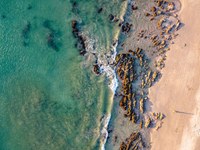Oil Spill Incident in Israel – Feb 24, 2021
On Wednesday 17 February, REMPEC received a request of assistance from the competent authorities of Israel, with regards to the beaching of a large quantities of tar balls, on the Israeli shoreline.
Factsheet
- Most of the pollution has already reached the shores, however there is remobilisation from one polluted site to another due to waves and currents.
- The length of the coast affected is approximately 160 km.
- The amount of pollution differs in scale from very-slight to medium-heavy pollution.
- The affected shoreline types goes from sandy, gravel and pebble beaches, to rocky beaches, as well as coastal cliffs, stone walls of historical or archaeological sites, manmade marine constructions (e.g. ports, marinas, etc..) and coastal infrastructures (promenades, lifeguard structures, etc…)
- As of 23 February 2021, 1,000m3 of tar balls were collected.
- Clean up operations are still ongoing on some beaches and collected waste are being treated.
- Investigations are still on going to assess the overall amount of pollution.
What REMPEC is doing to support the identification of the source of the pollution affecting the coast of Israel
- On behalf of Israel, REMPEC liaised with the Maritime Support Service (EMSA) and the Emergency Response Coordination Centre (ERCC) to obtain satellite image of possible source of pollution.
- REMPEC invited the Eastern Mediterranean countries to report any pollution in the last three weeks. No pollution was reported by countries who responded.
- Based on identified potential source of pollution using satellite images, and Authentication Information System (AIS) data, provided by the EMSA Maritime Support Service, 10 vessels were found in the vicinity of the possible original position of the spill. Further investigations are ongoing.
- The sampling of collected tar balls will be analysed by the France-based research centre Cedre following a technical conference call organised by REMPEC.
What REMPEC is doing to coordinate potential impact in neighbouring countries
-
REMPEC activated Mediterranean Assistance Unit, to obtain results of forecasting model from the Mediterranean Operational Network for the Global Ocean Observing System (MONGOOS), with a view to assessing the potential impact to neighbouring countries. (More details on the service)
- REMPEC established contact with the Lebanese Competent Authorities to address the possible pollution of the Lebanese shoreline.
- REMPEC liaised with Cyprus and Egypt to investigate on a possible oil slick presence at sea. No pollution was confirmed by the consulted countries.
What REMPEC is doing to coordinate offers of assistance
- REMPEC received several offers of , which were communicated to Israel for consideration. This coordination support in the initial stage of the emergency, to allow competent authorities to focus on the response and ensure the offers received meet the needs of the local authorities. Contracting Parties adopted a set of procedures and forms for request and offer of assistance, which were used in this incident (Decision IG.23/11:Mediterranean Guide on Cooperation and Mutual Assistance in Responding to Marine Pollution Incidents)
- REMPEC will continue liaising with the competent of Israel to support the coordination of assistance.
- REMPEC has mobilised within the framework of the MAU, experts from Cedre and the Italian Institute for Environmental Protection and Research, ISPRA, to provide remote assistance to Israel. On 1 March a conference call was organised by REMPEC bringing together representatives of Israeli authorities, Cedre and ISPRA.


